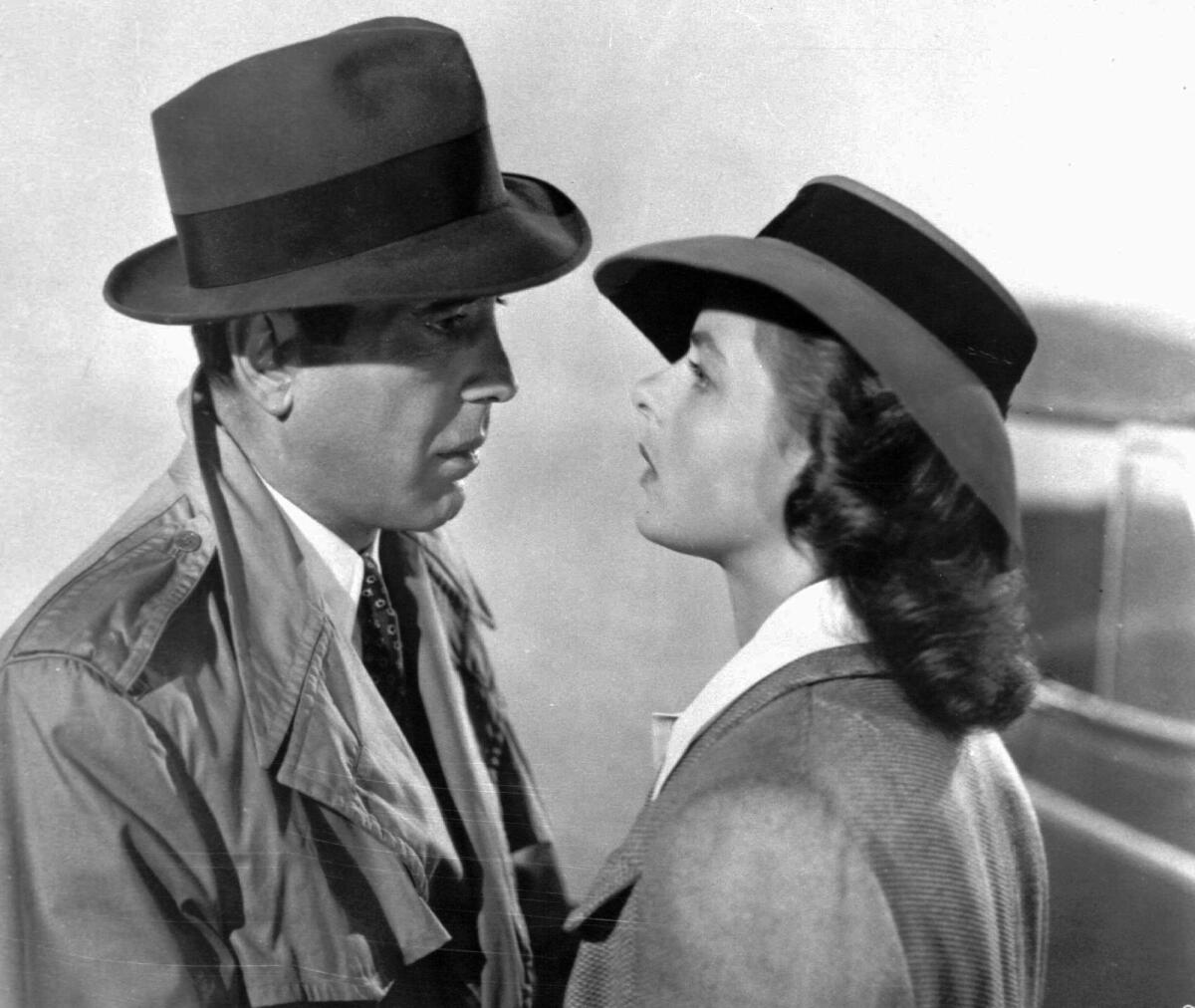From the Archives: ‘Casablanca’ romantic, highly topical event

With its setting in the North African town where a famous wartime conclave was just held, “Casablanca,” on view at Warner Bros. Hollywood and downtown theaters, is bound to be an enormous beneficiary from this historical event. It is one of those lucky pictures which happens to be linked right with the headline and which the organization that sponsors appears to show a flair for producing.
After all, it’s something to have the president of the United States and the prime minister of England assisting your advance exploitation.
While this happened locally, it didn’t prevail, of course, in all other centers. The New York premiere took place some time ago.
Regardless of the latest arresting happenings linked with the war, the picture would unquestionably thrive on account of its general timeliness. The topical nail is binged right on the head.
ROMANTIC SAGA
Actually, the story told is a wholly romantic one about the wife of a Czech patriot who thought her husband had met his death in a German concentration camp and fell in love with an exiled American in Paris.
From this sentimental foundation, vast issues arise, associated with the evacuation of refugees from a port that at the time of the narrative is under the dominion of Vichy, incidentally the Third Reich.
Casablanca is depicted, with probably some truth, as a labyrinth of intrigues, costly dealings in human welfare, murder and occasionally even rapine, accomplished with the least possible disturbance to its amour-propre as a modern hell hole.
The French prefect (Claude Rains) will sell his favors for a price, which may be paid either in money or through more venal considerations. Maj. Strasser, military envoy from the Reich (Conrad Veidt) is absorbed in the extension of its powers to the African embarkation point. It is a good place to catch quarry that has escaped the clutches of the Gestapo.
Signor Ferrari (Sydney Greenstreet) barters and trades in lives, ensuring safe transit by means of visas that carry with them more or less weight and authenticity. Ugarte (Peter Lorre) is another of the same ilk, lower in class, who briefly falls heir to a very valuable passport following the murder of two of the German secret police. He dies quickly.
Victor Laszlo (Paul Henreid) and his spouse, Ilsa Lund (Ingrid Bergman), are “suspected” of being accessories to the crime, though actually what Henreid is wanted for is his activities in behalf of enslaved peoples.
Sinister, sullen and, to the outside world, having no truck with any of them is Rick, the American (Humphrey Bogart). He announces himself as a saloonkeeper, though he has a resort and gambling den of some pretensions.
In the whole situation he is the “X,” or unknown quantity, and, eventually, which way he decides to swing turns the trick, for early in the story he comes into possession of the coveted visas which will get anybody off to Lisbon.
VARIED MOTIFS
The tale as unfolded is one of love, hate, revenge and gallantry and will please those who watch its visualization because of its fine reserve during most of its telling.
In a crucial climaxing scene between Bogart and Miss Bergman, it falls a little short of complete conviction and becomes rather too archly sentimental, but then probably nobody will quarrel about that, either. The audience at the showing which I saw yesterday was on edge with tenseness to the finale.
It’s an exceptionally well-directed and well-played picture, this “Casablanca,” much honor to the members of the cast as mentioned, with additionally S.Z. Sakall, the remarkable Dooley Wilson, Madeleine Lebeau, Leonid Kinskey, John Qualen and various others.
Michael Curtiz directed with plenty of punch in the bulk of the episodes. Julius J. and Philip G. Epstein and Howard Koch wrote the screenplay.
More to Read
Only good movies
Get the Indie Focus newsletter, Mark Olsen's weekly guide to the world of cinema.
You may occasionally receive promotional content from the Los Angeles Times.










